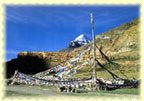|
||||||
 |
||||||
|
||||||||||||||||||||||||||||||||||||||||||||||||||||
|
|
||||||||||||||||||||||||||||||||||||||||||||||||||||
All contents of this website © 2010 Kailashzone Charitable Foundation |
||||||||||||||||||||||||||||||||||||||||||||||||||||
 |
||
The Tantric land of Trita Puri
At the sacred land of Trita
Puri, Trita Puri is mainly a Buddhist site to pay homage to Dorjee Pegmo (Vajrayogini): the divine consort of Chakrasamvara (Tib. Dechog). Buddhists claim that Trita Puri is the origin of Tantric tradition of Tibetan Buddhism because it is believed where the most furious devil Mata Ruta was tvanquished. Says that without visiting Trita Puri, no merit can be earned in pilgrimage to Mt Kailash and Manasarovar". It explains how important the land is. Practically all Buddhist pilgrims visiting Mount Kailash and Manasarovar go to Trita Puri and get blessed by the mystical sights to be viewed and studied about tantric traditions of Buddhism.
According to the theory of the twenty four sacred palaces of Chakrasamvara. Trita Puri was one of the eight lands, which were occupied by the Nagas. The great Indian master Pedmasambhava said, "this is the land, which is consecrated by Dorjee Pegmo, where all goddesses gather. This is where echoes the sacredness of tantric sound. Pilgrims visiting this land are able to achieve liberation in a life-time".
Trita Puri is located a days journey south of Mt Kailash and Manasarovar lake. Where the white and red hot springs are counted as the center of the sacred land. In the surrounding environment, the east is a tiger, it refers the mountain, which has yellowish colour with black lines. The west is a turquoise dragon, which means Sutlej (Tib. Langchen Khabab) the river. The south is a red bird, it refers to the mountain, which has a sharp beak and is red in colour. The north is a yellow tortoise , which refers to the yellow mountain. Trita Puri Monasteries and sacred sitesThere are three main retreat caves in position, one above another. The bottom one is the cave of Dorjee Pegmo. The middle one belonged to Gyalwa Godtsang pa, the one who established the walking path around Mt Kailash. The top one was used by the great Indian master Guru Rinpoche. Guru cave is in the Trita Puri Monastery. It has un-man-made images of the eight manifestations of Guru Rinpoche and a hole in the side of the cave. At the time of Guru Rinpoche, there was a female demon who claimed ownership of Trita Puri. Guru Rinpoche vanquished the female demon, transmitting her soul to the land of Amitabha. Through that process, the hole was created from the world of Nagas to the earth. Now, to everyone's wonder, the hole brings air from the Naga's world.
The cave of Gyalwa Godtsang pa is located on the other side of the Tripuri Monastery. There is another monastery which is connnected to the cave, and was founded by a Nyingpa lama called Choe Nyid Sang Po. Some generations ago, the cave was converted into a room of guardians (Tib. Gon Khang). Since then, only ordained monks are allowed to go into the cave. In the cave, there are statues of a four armed Gonpo, Dorjee Pegmo and Buddha Shakyamuni. In the main hall of the monastery, there is an statue of Buddha Shakyamuni, produced out of sandal wood. A beautiful stupa, other statues, beautiful paintings and other religous objects. There is a stone in the shape of an egg, it is an important object. The stone was brought by Gyalwa Godtsang pa from the depths of Manasarovar lake as a treasure. Gyal Godtsang promised that the stone will fulfil anyone's wishes. In the cave of Dorjee Pegma, pilgrims collect a type of soil called Jang-Sem-Karpo, which is used as a blessing from the sacred land of Trita Puri. Traditionally, people offer a Kateg (a white scarf) and eight Tam Ka Karpo, (old Tibetan currency) as payment for the soil.
The hotspring of Trita Puri is believed to cure sickness and many pilgrims go there to take bath and wash of their negative karmas. It is simply nice to sit in the hot water and get relaxed.
|
||
| Sacred
sites at the Mount Kailash | Senge
Tenzin Rinpoche | Ngari:
western Tibet | Limi: northwestern Nepal | Dolpo: eastern Nepal |












 Trita
Puri Monastery contents an large statue of Guru Rinpoche in the
center. A Buddha Amitabha statue on the right. A Buddha Shakyamuni
on the left. Additionally, there are footprints of Guru Rinpoche,
dakini Yeshi Tsogyal, Dorjee Pegmo, and others, in separate places
of the rocks. Behind the Monastery, there is a mountain made out
of multi-coloured soils, which is known
as the Palace of The Nine Thousands Buddhas. Around the Monastery
there are 13 special shaped rocks. Many of which have natural images,
including Mt Kailash. Avalokitesvara with eleven heads and a thousands
hands. Vajrapani Buddha. An eagle. Each of them have their own significance.
Trita
Puri Monastery contents an large statue of Guru Rinpoche in the
center. A Buddha Amitabha statue on the right. A Buddha Shakyamuni
on the left. Additionally, there are footprints of Guru Rinpoche,
dakini Yeshi Tsogyal, Dorjee Pegmo, and others, in separate places
of the rocks. Behind the Monastery, there is a mountain made out
of multi-coloured soils, which is known
as the Palace of The Nine Thousands Buddhas. Around the Monastery
there are 13 special shaped rocks. Many of which have natural images,
including Mt Kailash. Avalokitesvara with eleven heads and a thousands
hands. Vajrapani Buddha. An eagle. Each of them have their own significance.